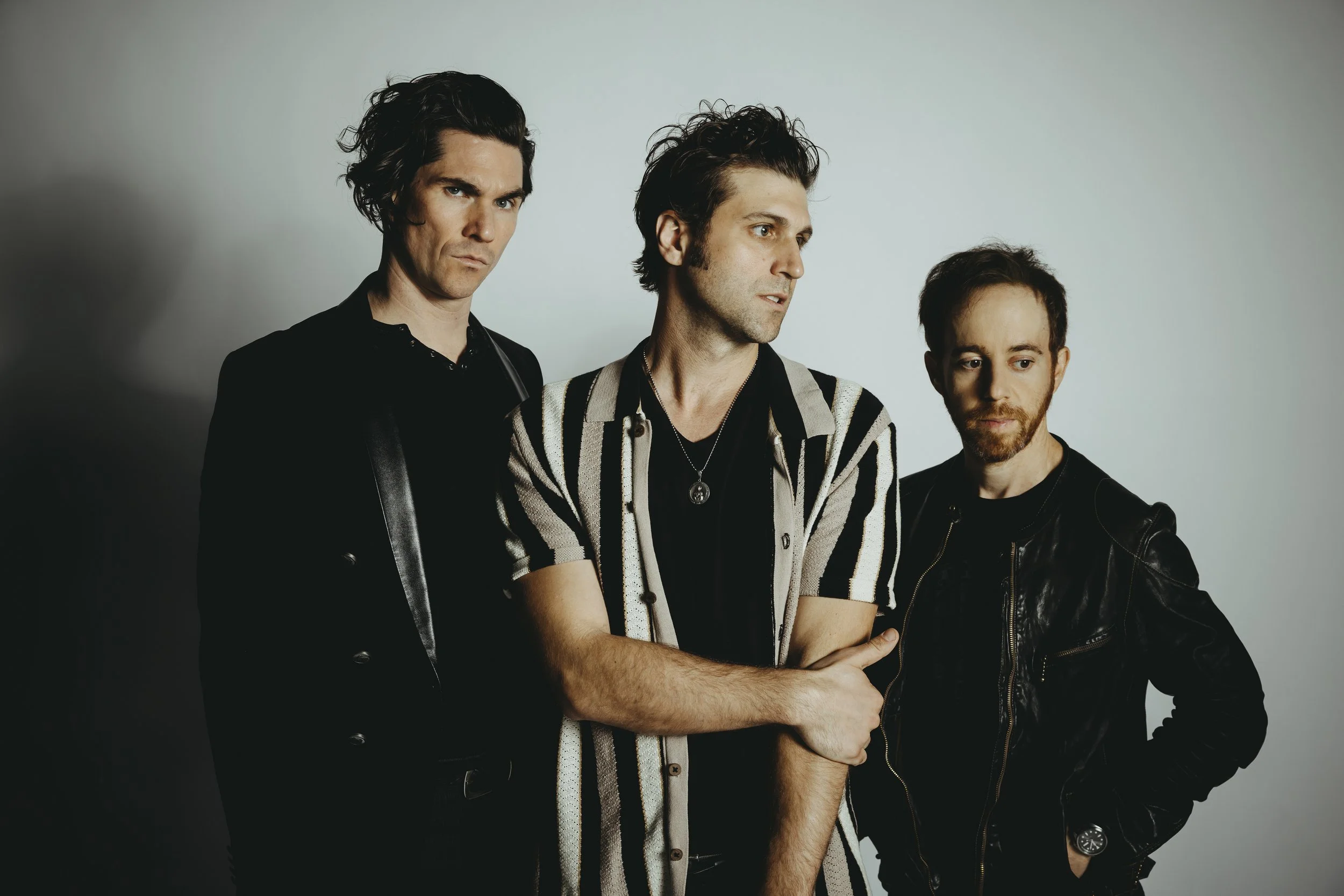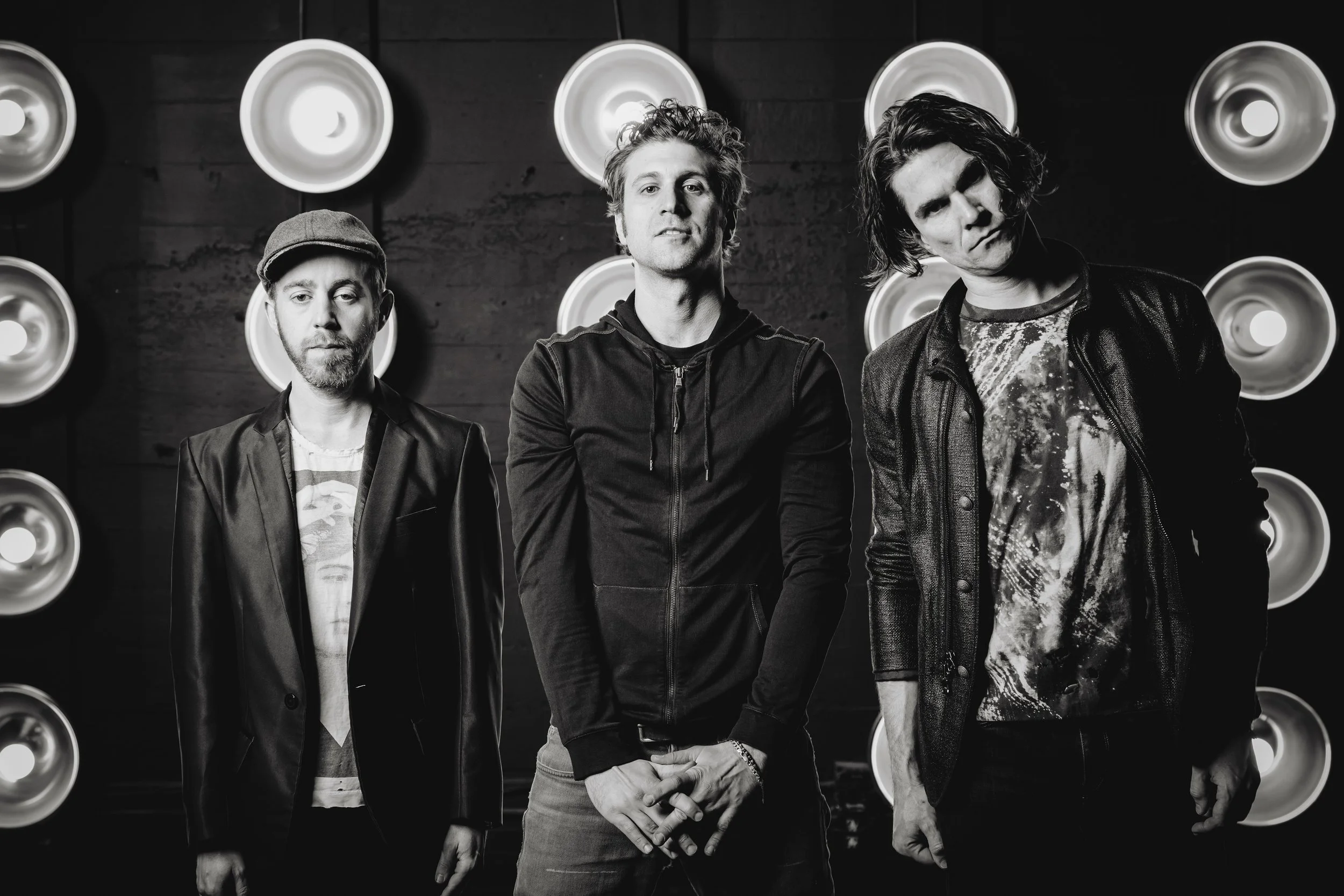THE HIGHS AND LOWS OF HOLLYWOOD: AN INTERVIEW WITH RADIATOR KING'S ADAM SILVESTRI
Photo by Michelle Shiers
For the last decade, Radiator King has been the moniker of NYC-via-Boston solo artist Adam Silvestri. But since he moved to L.A. in 2021 at the urging of longtime collaborator/drummer/Dresden Dolls co-founder Brian Viglione, the two have teamed up with keyboardist Alexander Burke (Bob Dylan, Anderson .Paak, Greg Dulli) to form a proper band with a fixed lineup and all members contributing to the writing process.
Radiator King's new single "Dream"—recorded with Grammy-winning producer Ted Hutt (The Gaslight Anthem, Violent Femmes, Old Crow Medicine Show)—is a driving, radio-ready alternative-rock anthem with thunderous drums, shimmering organ and a guitar hook that won't quit. The song is a classic tale from the underbelly of Hollywood, but with a hopeful twist. Inspired by the sex workers who walk the streets near the band's rehearsal space, it ruminates on the razor's edge between success and failure, and on what leads people down different paths in life, while at once acknowledging the humanity in all our struggles.
Your new single “Dream” deals with the stark day-to-day realities you’ve experienced living in Hollywood the last few years. What was it in this case that captured your attention, that stopped you in your tracks enough to turn it into a song?
I think wherever you live will inevitably play a significant role in the music you make. Living in Hollywood, it's been very different than anywhere I’ve lived before. There’s glitz and glamour, but there’s also this darkness—these ghosts of lost dreams exiled to the dark alleys. If you pay attention, you’ll see them all around.
Over on Santa Monica Boulevard by our rehearsal space, I always drive by these two sex workers who hang out on the corner. They couldn't be much older than their early 20s. I’ve wondered many times about their story. About how they got to be standing out there at this point in their lives. Maybe some big dream led them to Hollywood, but then reality eventually pulled them under, and they had to figure out a way to survive. That’s where the song began.
Sometimes we're forced into circumstances in life that we didn't choose. I think it’s important to remind ourselves. "Dream" is a heavy song for sure, but I think the overall message is a positive one. Because no matter how lost or abandoned we feel, we can always turn the page.
There have been many songs about the dark side of Hollywood and the pursuit of fame. How does “Dream” fit into that tradition, and also how does it stake out its own unique philosophical territory?
That old story of selling your soul for riches and stardom has been in our folklore even before there was recorded music. It's basically the story of Robert Johnson at the crossroads. There's a reason for this. It's a cautionary tale with deep roots in human history. That temptation exists for us all, and we can all relate to the dilemma. Now, which side of us wins out, that's for each of us to decide.
“Dream” tells the story of leaving the boring place you grew up for the excitement of the unknown. The freedom of leaving your past behind and totally reinventing yourself under big-city lights. But chasing adventure can lead us down some pretty dangerous roads if we aren’t careful. If there's a unique philosophy to our take, I’d say it lies in the perspective that there's always a way back from the edge. The sense of adventure and curiosity we have when we're young is such a beautiful thing. It can start us on these wild journeys and can make us feel so alive. But that same part of us, if left unchecked, can lead us down a very self-destructive path.
Radiator King began as more of a solo vehicle for you, but over the years, it’s developed into more of a collaborative project. How has this played into the writing process and the evolution of “Dream?”
Yeah, that’s true. It has become more collaborative. “Dream” started out with a riff I wrote on guitar. For weeks, we would jam on it at rehearsal. We knew it had potential, but we couldn’t quite crack the code at first. It wasn’t until Alex tried playing the riff on his Mini Moog that it really began to take shape. That riff, combined with Brian’s tribal drumming, made for this perfect rhythmic bed that I was free to experiment on top of. That was a breakthrough. From there, we could see the direction the song should go, and it didn’t take long to get there.
If I had written the song on my own, it would have come out completely different. Every musician hears a musical idea in their own way. The early stages of a song are very abstract and can be interpreted endlessly. So when I bring a riff to the band, we usually all have our own idea about how it fits into the context of a song, and those ideas play out when we jam together. Jamming is how we communicate our different ideas, and that experimentation phase with a band allows you to come up with a song you never could've on your own. The magic in that formula happens when you have exceptional musicians with wonderfully creative minds. Alex and Brian definitely check the box on both.
Photo by Michelle Shiers
I understand that, musically, this new song was born out of experimentation with an effect pedal for your guitar. As an artist, how do your tools influence the creative process?
A while back, I got this gnarly fuzz pedal that was just really over the top and extreme. Brian and I went down to the rehearsal space to try it out, and as I played guitar, Brian was manipulating the settings. The sounds we were getting were just this sonic onslaught of fuzzed-out tones. It led me to play this heavy, repetitive, hypnotic riff. This became the foundation for the song and was 100 percent inspired by the pedal. That’s the cool thing about a unique piece of gear—it can lead you in a new direction, like a painter using a new medium or a new palette of colors.
Tools can influence the creative process pretty significantly. I’ve personally found that a tool with some sort of limiting quality always ends up having the most influence for me. There was this 1950s Harmony acoustic guitar I bought off an old man in South Central who played gospel music in a Baptist church. The guitar had a beautiful sound, but was very difficult to play because it was so old and was so out of whack. I had no choice but to play it differently, which led me to write differently. It was pretty inspiring. I’ve gotten a lot of songs out of that guitar.
What is it about the distinct musical personalities in Radiator King that makes the band work as a whole?
Each of us comes from such a different background in life and in music, and we all bring those different elements to the band, and it gives our sound an edge. But at the same time, there are some incredibly crucial elements we all share—not just with our musical tastes but philosophically too. We see eye to eye on the ideas that matter.
But because of our differences, it allows for an environment where anything goes—all ideas are welcome. We all share the opinion that good music must be interesting, and in order to be interesting, it has to be eclectic.
You collaborated with veteran producer Ted Hutt on “Dream” and your last few singles. How has he influenced the band’s sound, and what’s the most important thing you’ve learned from him?
The most important piece of wisdom Ted gave us was to bring our own unique musical background into the band and to let those different ingredients clash together to make a sound that is distinctly our own. From the start, he encouraged us to embrace the things that set us apart, regardless of whether it lined up with any preconceived notions we had about the band's sound. It’s been so valuable to have an outside person we trust to give us all these insights. It's had a major effect on our music.
Looking ahead, how do you envision your sound evolving from this point? Are there new themes or styles you want to explore? What’s next for Radiator King?
There are always new themes and styles we're exploring. Our particular tastes at any given time influence what we create—the books we read, the movies we see, the people we hang out with, etc. Lately, we’ve been playing a whole lot at Brian’s house. He’s got some recording gear over there, and we've been experimenting with different textures and sounds. We’ve been really into combining lo-fi sounds with hi-fi sounds. Counterpoint has been a theme we’ve been exploring lately, and I think we'll continue down that path.


